英语介词和介词短语
介词和介词短语的常见用法总结
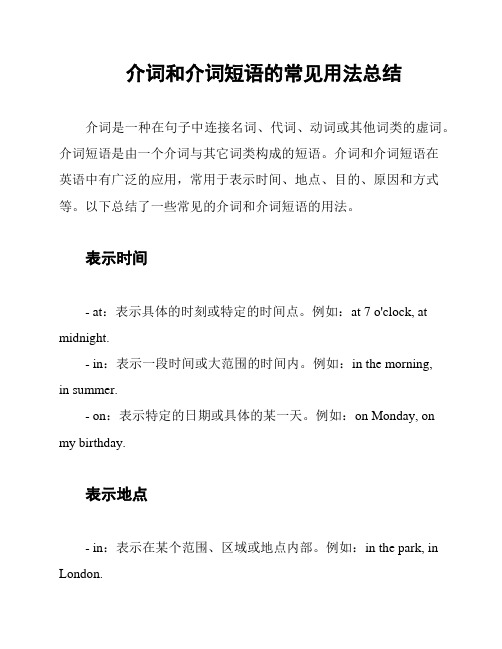
介词和介词短语的常见用法总结介词是一种在句子中连接名词、代词、动词或其他词类的虚词。
介词短语是由一个介词与其它词类构成的短语。
介词和介词短语在英语中有广泛的应用,常用于表示时间、地点、目的、原因和方式等。
以下总结了一些常见的介词和介词短语的用法。
表示时间- at:表示具体的时刻或特定的时间点。
例如:at 7 o'clock, at midnight.- in:表示一段时间或大范围的时间内。
例如:in the morning,in summer.- on:表示特定的日期或具体的某一天。
例如:on Monday, on my birthday.表示地点- in:表示在某个范围、区域或地点内部。
例如:in the park, in London.- on:表示在某个表面或位置上。
例如:on the table, on the wall.- at:表示在某个具体的地方或位置。
例如:at home, at the bus stop.表示目的- for:表示为了某个目的或目标。
例如:for studying, for fun.- to:表示朝向某个目标或方向。
例如:to the park, to the station.表示原因- because of:表示由于某个原因。
例如:because of the rain, because of her illness.- due to:表示由于某个特定的原因。
例如:due to budget constraints, due to his absence.表示方式- by:表示通过某种方式或方法。
例如:by car, by email.- with:表示使用某种工具或伴随的状态。
例如:with a pen, with a smile.以上是一些常见的介词和介词短语的用法总结。
在实际使用中,要根据具体的语境和表达需要来选择合适的介词和介词短语。
介词与介词短语
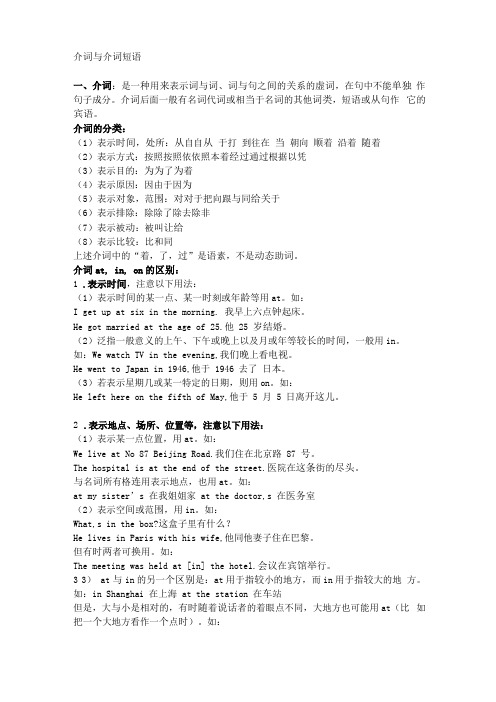
介词与介词短语一、介词:是一种用来表示词与词、词与句之间的关系的虚词,在句中不能单独作句子成分。
介词后面一般有名词代词或相当于名词的其他词类,短语或从句作它的宾语。
介词的分类:(1)表示时间,处所:从自自从于打到往在当朝向顺着沿着随着(2)表示方式:按照按照依依照本着经过通过根据以凭(3)表示目的:为为了为着(4)表示原因:因由于因为(5)表示对象,范围:对对于把向跟与同给关于(6)表示排除:除除了除去除非(7)表示被动:被叫让给(8)表示比较:比和同上述介词中的“着,了,过”是语素,不是动态助词。
介词at, in, on的区别:1.表示时间,注意以下用法:(1)表示时间的某一点、某一时刻或年龄等用at。
如:I get up at six in the morning. 我早上六点钟起床。
He got married at the age of 25.他 25 岁结婚。
(2)泛指一般意义的上午、下午或晚上以及月或年等较长的时间,一般用in。
如:We watch TV in the evening,我们晚上看电视。
He went to Japan in 1946,他于 1946 去了日本。
(3)若表示星期几或某一特定的日期,则用on。
如:He left here on the fifth of May,他于 5 月 5 日离开这儿。
2.表示地点、场所、位置等,注意以下用法:(1)表示某一点位置,用at。
如:We live at No 87 Beijing Road.我们住在北京路 87 号。
The hospital is at the end of the street.医院在这条街的尽头。
与名词所有格连用表示地点,也用at。
如:at my sister’s 在我姐姐家 at the doctor,s 在医务室(2)表示空间或范围,用in。
如:What,s in the box?这盒子里有什么?He lives in Paris with his wife,他同他妻子住在巴黎。
英语中的介词和介词短语
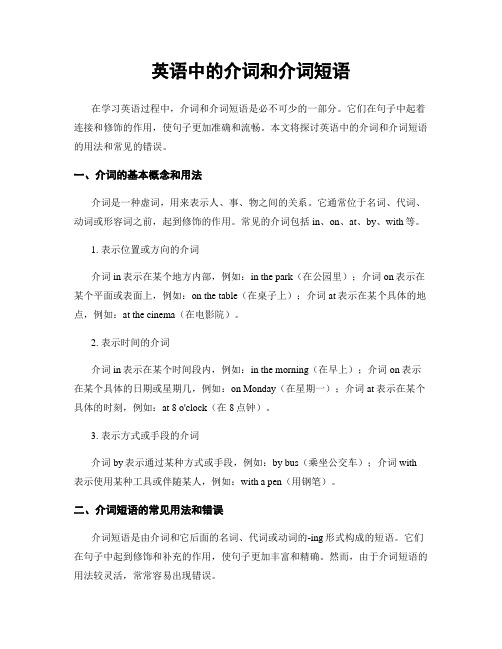
英语中的介词和介词短语在学习英语过程中,介词和介词短语是必不可少的一部分。
它们在句子中起着连接和修饰的作用,使句子更加准确和流畅。
本文将探讨英语中的介词和介词短语的用法和常见的错误。
一、介词的基本概念和用法介词是一种虚词,用来表示人、事、物之间的关系。
它通常位于名词、代词、动词或形容词之前,起到修饰的作用。
常见的介词包括in、on、at、by、with等。
1. 表示位置或方向的介词介词in表示在某个地方内部,例如:in the park(在公园里);介词on表示在某个平面或表面上,例如:on the table(在桌子上);介词at表示在某个具体的地点,例如:at the cinema(在电影院)。
2. 表示时间的介词介词in表示在某个时间段内,例如:in the morning(在早上);介词on表示在某个具体的日期或星期几,例如:on Monday(在星期一);介词at表示在某个具体的时刻,例如:at 8 o'clock(在8点钟)。
3. 表示方式或手段的介词介词by表示通过某种方式或手段,例如:by bus(乘坐公交车);介词with 表示使用某种工具或伴随某人,例如:with a pen(用钢笔)。
二、介词短语的常见用法和错误介词短语是由介词和它后面的名词、代词或动词的-ing形式构成的短语。
它们在句子中起到修饰和补充的作用,使句子更加丰富和精确。
然而,由于介词短语的用法较灵活,常常容易出现错误。
1. 错误的介词选择很多学习者在使用介词短语时容易选择错误的介词。
例如,错误的使用介词at表示在某个日期,而正确的应该是on。
另外,错误的使用介词in表示在某个时间点,而正确的应该是at。
2. 介词短语的位置错误有时候,介词短语的位置放置错误,导致句子的意思不清晰。
例如,错误的将介词短语放在句子的开头,而正确的位置应该是句子的结尾或名词的后面。
3. 错误的介词短语搭配有些介词短语的搭配是固定的,不能随意替换。
英语中的介词和介词短语
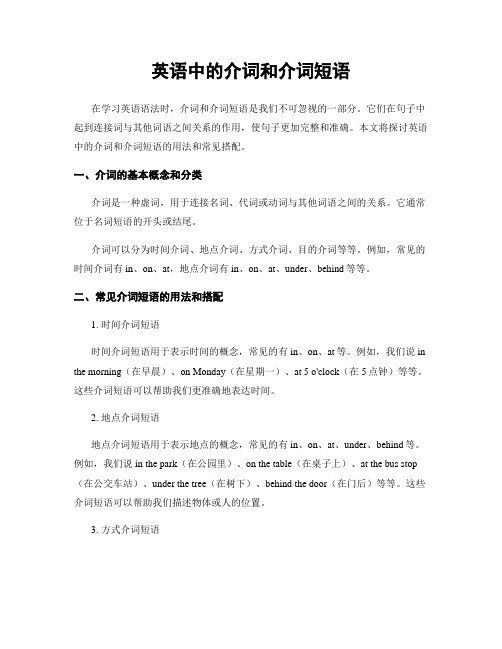
英语中的介词和介词短语在学习英语语法时,介词和介词短语是我们不可忽视的一部分。
它们在句子中起到连接词与其他词语之间关系的作用,使句子更加完整和准确。
本文将探讨英语中的介词和介词短语的用法和常见搭配。
一、介词的基本概念和分类介词是一种虚词,用于连接名词、代词或动词与其他词语之间的关系。
它通常位于名词短语的开头或结尾。
介词可以分为时间介词、地点介词、方式介词、目的介词等等。
例如,常见的时间介词有in、on、at,地点介词有in、on、at、under、behind等等。
二、常见介词短语的用法和搭配1. 时间介词短语时间介词短语用于表示时间的概念,常见的有in、on、at等。
例如,我们说in the morning(在早晨)、on Monday(在星期一)、at 5 o'clock(在5点钟)等等。
这些介词短语可以帮助我们更准确地表达时间。
2. 地点介词短语地点介词短语用于表示地点的概念,常见的有in、on、at、under、behind等。
例如,我们说in the park(在公园里)、on the table(在桌子上)、at the bus stop (在公交车站)、under the tree(在树下)、behind the door(在门后)等等。
这些介词短语可以帮助我们描述物体或人的位置。
3. 方式介词短语方式介词短语用于表示行为的方式或方法,常见的有by、with等。
例如,我们说by car(乘坐汽车)、with a pen(用一支笔)等等。
这些介词短语可以帮助我们描述行为或方式。
4. 目的介词短语目的介词短语用于表示目的或目标,常见的有for、to等。
例如,我们说study for the exam(为了考试而学习)、go to the park(去公园)等等。
这些介词短语可以帮助我们表达目的或动机。
三、介词和介词短语的常见错误用法在使用介词和介词短语时,我们需要注意一些常见的错误用法。
介词与介词短语英语知识点总结

介词与介词短语英语知识点总结介词是一种用来表示名词与其他词或短语之间关系的词类。
常见的介词有in, on, at, for, with等。
1. 位置关系:- 在某位置:in, on, atin表示在物体或空间内部,on表示在物体表面,at表示在具体位置或某地。
例句:He is in the room. She is sitting on the chair. They are waiting at the bus stop.- 离开某位置:from, off, out offrom表示离开某一具体位置,off表示从某一表面离开,out of表示从某一空间或物体内部离开。
例句:He is coming from the airport. The cat jumped off the table. She took her phone out of her bag.2. 时间关系:- 表示具体时间:in, on, atin表示在某一段时间内,on表示在某一具体日期或星期,at 表示在某一具体时间。
例句:We will have a meeting in the afternoon. I will see him on Monday. The movie starts at 7 o'clock.- 表示时间段:during, forduring表示在某一整个时间段内,for表示在某一时间段的持续时间。
例句:He slept during the night. I will stay here for a week.3. 关系连接:- 表示原因:because of, due tobecause of表示由于,due to表示由于(正式用语)。
例句:He couldn't come because of the rain. The event was canceled due to bad weather.- 表示目的:for, tofor表示为了某一目的,to表示向某一目的地或对象。
介词和介词短语

介词和介词短语介词和介词短语在英语语法中起着非常重要的作用。
它们用于表达时间、地点、原因、方式等等,能够增添句子的丰富性和准确性。
在本文中,我们将探讨介词和介词短语的用法及其在句子中的作用。
一、介词的定义和基本用法介词是一种虚词,通常放在名词或代词前面,用来表示该名词或代词与其它成分之间的关系。
常见的介词有in、on、at、by、with等。
1. 表示时间关系的介词介词经常被用来表示时间关系,如at、in、on等。
- I will have a meeting at 10 o'clock tomorrow morning.- She was born in May, 1990.- We usually go hiking on Sundays.2. 表示地点关系的介词介词可以用来表示地点关系,如in、on、at等。
- The cat is sitting on the table.- There is a park in front of our school.- He lives at 123 Main Street.3. 表示方式、原因、伴随关系的介词介词也可以用来表示方式、原因和伴随关系,如by、with等。
- I like to travel by train.- She won the game with her superb skills.- He passed the exam by studying hard.二、介词短语的定义和用法介词短语由一个介词和其后的名词或代词构成,用于更加具体和准确地描述名词或代词之间的关系。
1. 介词短语作定语介词短语可以用作名词的定语,修饰名词的含义、特点等,通常位于名词之前。
- The man in the blue shirt is my brother.- I need a pen with a black ink.2. 介词短语作状语介词短语可以用作句子的状语,修饰动词、形容词或副词,说明动作、状态或程度。
介词及介词短语的英语常见用法

介词及介词短语的英语常见用法介词是用于名词词组或相当于名词词组的结构之前,表示词语之间意义关系的词类。
下面是店铺整理的一些关于介词及介词短语的常见用法,欢迎大家阅读!介词及介词短语的英语常见用法一、介词的分类英语常用的介词大致可分为四类:1.简单介词顾名思义,简单介词是指由一个单词构成的介词,也是使用最频繁的一类介词。
简单介词也可能由形容词、副词、分词、名词、连词等转变而来。
常用的简单介词有:at,about,above,across,after,among,against,before,behind,below,beside,between,beyond,but,despite,during,except,for,in,of,on,over,near,past,round,since,through,till,until,with,up等。
2.合成介词指由介词+其它介词或副词构成的介词。
常用的合成介词有:inside,into,onto,outside,throughout,towards,within,without等。
3.二重介词指由两个单一的介词并列在一起,作为一个介词使用并表达一个完整意思的介词。
常见的二重介词有:from among,from behind,from under,until /till after等。
4.短语介词指由介词+介词、介词+名词、介词+分词、介词+动词、介词+形容词、介词+副词等构成的短语.常用的有:according to,along with,in front of,by means of,in spite of,together with,with regard to等。
短语介词与介词短语不同。
介词短语是由介词加宾语构成,本身可作句子成分,如定语或状语等,可单独使用;而短语介词是用作介词的短语,不可独立使用,本身不能作句子成分,后面要跟名词、动名词或代词等。
高中英语知识点归纳介词与介词短语
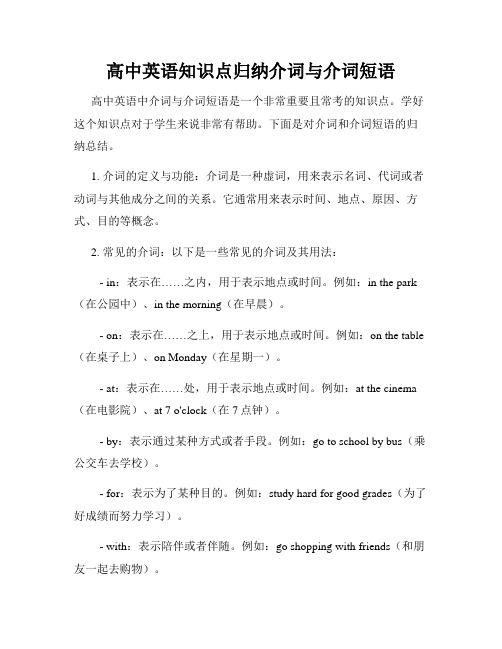
高中英语知识点归纳介词与介词短语高中英语中介词与介词短语是一个非常重要且常考的知识点。
学好这个知识点对于学生来说非常有帮助。
下面是对介词和介词短语的归纳总结。
1. 介词的定义与功能:介词是一种虚词,用来表示名词、代词或者动词与其他成分之间的关系。
它通常用来表示时间、地点、原因、方式、目的等概念。
2. 常见的介词:以下是一些常见的介词及其用法:- in:表示在……之内,用于表示地点或时间。
例如:in the park (在公园中)、in the morning(在早晨)。
- on:表示在……之上,用于表示地点或时间。
例如:on the table (在桌子上)、on Monday(在星期一)。
- at:表示在……处,用于表示地点或时间。
例如:at the cinema (在电影院)、at 7 o'clock(在7点钟)。
- by:表示通过某种方式或者手段。
例如:go to school by bus(乘公交车去学校)。
- for:表示为了某种目的。
例如:study hard for good grades(为了好成绩而努力学习)。
- with:表示陪伴或者伴随。
例如:go shopping with friends(和朋友一起去购物)。
3. 介词短语的使用:介词短语由介词和其后面的宾语构成,它在句子中作状语,修饰动词、形容词或者副词。
- 例如:He is good at playing basketball.(他擅长打篮球。
)- 例如:She is interested in art.(她对艺术感兴趣。
)4. 特殊用法与常见搭配:- in front of:在……前面。
- at the back of:在……后面。
- in the middle of:在……中间。
- at the beginning of:在……的开始。
- at the end of:在……的结尾。
- on the left/right:在左侧/右侧。
语法知识详解介词和介词短语
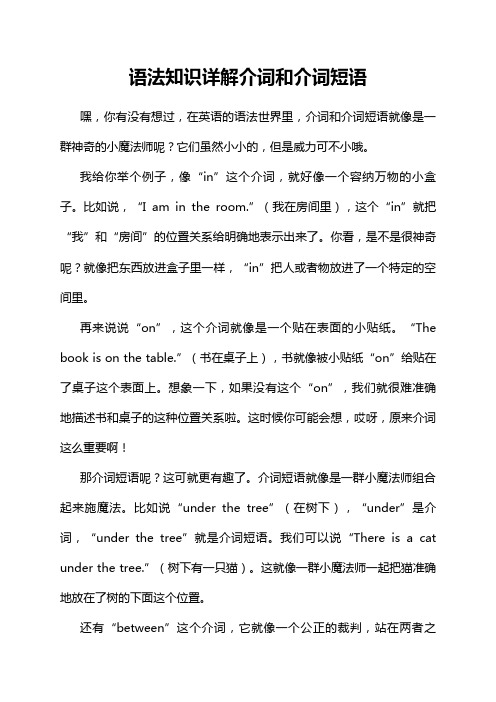
语法知识详解介词和介词短语嘿,你有没有想过,在英语的语法世界里,介词和介词短语就像是一群神奇的小魔法师呢?它们虽然小小的,但是威力可不小哦。
我给你举个例子,像“in”这个介词,就好像一个容纳万物的小盒子。
比如说,“I am in the room.”(我在房间里),这个“in”就把“我”和“房间”的位置关系给明确地表示出来了。
你看,是不是很神奇呢?就像把东西放进盒子里一样,“in”把人或者物放进了一个特定的空间里。
再来说说“on”,这个介词就像是一个贴在表面的小贴纸。
“The book is on t he table.”(书在桌子上),书就像被小贴纸“on”给贴在了桌子这个表面上。
想象一下,如果没有这个“on”,我们就很难准确地描述书和桌子的这种位置关系啦。
这时候你可能会想,哎呀,原来介词这么重要啊!那介词短语呢?这可就更有趣了。
介词短语就像是一群小魔法师组合起来施魔法。
比如说“under the tree”(在树下),“under”是介词,“under the tree”就是介词短语。
我们可以说“There is a cat under the tree.”(树下有一只猫)。
这就像一群小魔法师一起把猫准确地放在了树的下面这个位置。
还有“between”这个介词,它就像一个公正的裁判,站在两者之间。
“The ball is between the two boxes.”(球在两个盒子之间),如果把这个“between”去掉,那别人就搞不清楚球到底在哪里啦。
是不是感觉介词和介词短语就像生活中的小助手,没有它们,很多事情都乱套了呢?我记得有一次,我的朋友小明在描述他的东西在哪里的时候,就因为没有用好介词,闹了个大笑话。
他说“my pen is table.”(我的笔是桌子),这可把我们笑得不行。
如果他说“My pen is on the table.”(我的笔在桌子上),那就完全正确啦。
这就说明啊,介词和介词短语在准确表达意思方面起着超级重要的作用。
认识英语中的介词和介词短语

认识英语中的介词和介词短语英语中的介词和介词短语是语法中非常重要的一部分,它们在句子中起到连接词和短语的作用。
在这篇文章中,我们将详细了解介词和介词短语的用法和常见的错误。
一、介词的定义和用法介词是一种虚词,用来表示两个词或短语之间的关系。
它通常放在名词、代词、动词或句子的结构中。
常见的介词有at, in, on, with, to, for等。
以下是一些常见的介词用法:1. 表示位置关系:in, on, at介词"in"用于表示在某个范围或物体内部。
例如:- I am in the classroom.- The book is in the bag.介词"on"用于表示在某个表面或平面上。
例如:- The pen is on the desk.- The picture is on the wall.介词"at"用于表示在某个具体的位置或事件上。
例如:- She is at the park.- He is at the party.2. 表示时间关系:in, on, at介词"in"用于表示在某个时间段内。
例如:- I will meet him in the morning.- We have a party in the evening.介词"on"用于表示在某个具体的日期或星期几。
例如:- We will have a meeting on Monday.- The concert is on the 25th of December.介词"at"用于表示在某个具体的时刻。
例如:- They will arrive at 8 o'clock.- The movie starts at 9:30.3. 表示方式和原因:with, to, for介词"with"用于表示使用某个工具、方式或伴随着某人。
初中英语知识点归纳常用的介词和介词短语

初中英语知识点归纳常用的介词和介词短语介词是一种连接词,位于句子中,可以表达位置、方向、时间、原因、目的等含义。
在英语学习中,熟练掌握常用的介词和介词短语是非常重要的。
本文将对初中英语中常用的介词和介词短语进行归纳总结,帮助读者更好地理解和运用。
一、位置和方向类介词1. in :表示在某个具体空间或范围内e.g. in the room(在房间里)2. on :表示在某个平面或垂直面上e.g. on the table(在桌子上)3. at :表示在某个位置或地点e.g. at the park(在公园)4. under :表示在某物体的下方e.g. under the chair(在椅子下面)5. above :表示在某物体的上方e.g. above the clouds(在云层上)6. behind :表示在某物体的后方e.g. behind the door(在门后面)7. in front of :表示在某物体的前方e.g. in front of the building(在建筑物前面)二、时间类介词1. at :表示具体的时间点e.g. at 8 o'clock(在8点钟)2. on :表示在某一天或日期e.g. on Monday(在星期一)3. in :表示在某一段时间或月份e.g. in the morning(在早上)4. after :表示在某个时间之后e.g. after school(放学后)5. before :表示在某个时间之前e.g. before dinner(晚饭前)三、原因和目的类介词1. because of :表示由于某个原因e.g. He couldn't come because of the bad weather.(因为天气不好,他不能来。
)2. thanks to :表示由于某个好事发生e.g. Thanks to his help, I passed the exam.(多亏了他的帮助,我通过了考试。
高考英语介词和介词短语
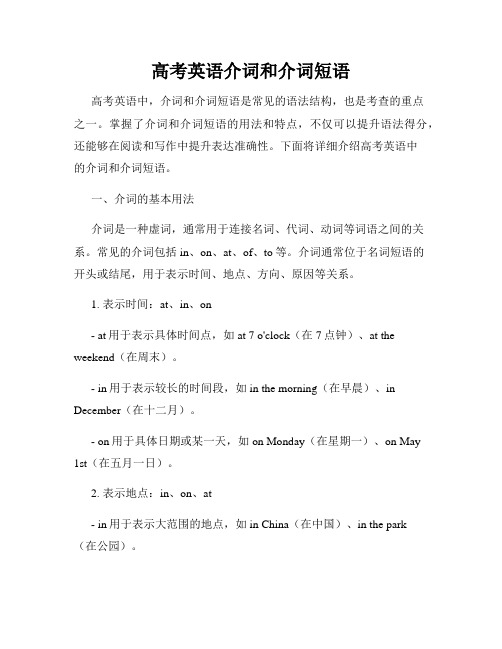
高考英语介词和介词短语高考英语中,介词和介词短语是常见的语法结构,也是考查的重点之一。
掌握了介词和介词短语的用法和特点,不仅可以提升语法得分,还能够在阅读和写作中提升表达准确性。
下面将详细介绍高考英语中的介词和介词短语。
一、介词的基本用法介词是一种虚词,通常用于连接名词、代词、动词等词语之间的关系。
常见的介词包括in、on、at、of、to等。
介词通常位于名词短语的开头或结尾,用于表示时间、地点、方向、原因等关系。
1. 表示时间:at、in、on- at用于表示具体时间点,如at 7 o'clock(在7点钟)、at the weekend(在周末)。
- in用于表示较长的时间段,如in the morning(在早晨)、in December(在十二月)。
- on用于具体日期或某一天,如on Monday(在星期一)、on May1st(在五月一日)。
2. 表示地点:in、on、at- in用于表示大范围的地点,如in China(在中国)、in the park(在公园)。
- on用于表示小范围的地点,如on the table(在桌子上)、on the bus(在公交车上)。
- at用于表示具体点位或某一地点,如at the cinema(在电影院)、at the corner(在拐角处)。
3. 表示方向:to、from- to表示运动的目的地,如go to school(去学校)、travel to Paris (去巴黎)。
- from表示运动的起点,如come from Beijing(来自北京)、fly from London to New York(从伦敦飞往纽约)。
4. 表示原因:because of、due to- because of和due to都可以表示原因,但用法稍有不同。
because of 后接名词或名词短语,due to后接名词或代词。
例如:He failed the exam because of his laziness.(他考试失败是因为他太懒了。
高考英语 介词及介词短语

2.in, to,on 用在方位名词前 in 表示在范围之内的地方; to 表示在范围之外的地方; on 表示两地接壤。 Shanghai lies in the east of China and to the north of Guangdong. 上海位于中国东部,广东北部。 3.near, by, beside 表示“在附近”
apart from 表示“此外,除……之外”,相当于 besides, as well as; 表示“撇开……来说,除掉”,相当于 except for;
28
in addition to 表示“除……之外还有……”,相当于 besides。如:
Apart from going shopping, the old lady likes walking after dinner except when it rains.
15
工具、手段、方式介词
1.by, in, on 三词都表示旅行的方式 (1)by 用在不涉及交通工具的名词前时,其前不带冠 词。如:by sea, by air, by water, by land, by rail 等。 (2)by 用在涉及交通工具的名词前时,此名词须用单 数,其前面不加冠词或修饰语。如:by bike, by taxi, by plane, by ship/boat,by train, by spaceship 等。
16
(3)当旅行方式涉及特指的交通工具时,用 on 或 in,名 词前用冠词、物主代词、指示代词等修饰语。如:travel to New York in this plane, leave on an early train, go to school on my bike 等。
英语语法-介词及介词词组

英语语法-介词及介词短语介词的功能介词是一种虚词,用来表示名词或相当于名词的其它词语句中其它词的关系,不能单独使用。
介词可与名词或相当于名词的其它词构成介词短语。
介词短语可在句中作定语,状语,表语和宾语补足语。
The boy over there is John’s brother. (定语)The girl will be back in two hours. (状语)Our English teacher is from Australia. (表语)Help yourself to some fish. (宾语补足语)种类(1) 简单介词,常用的有at, in, on, about, across, before, beside, for , to, without等。
(2) 复合介词,如by means of, along with, because of, in front of, instead of等。
常用易混介词辨析一.表示时间的介词1)at, in, onat一般指小地方;in一般指大地方或某个范围之内;on往往表示“在某个物体的表面”。
He arrived in Shanghai yesterday.They arrived at a small village before dark.There is a big hole in the wall.The teacher put up a picture on the wall.2)in front of, in the front ofin front of 表示“在某人或某物的前面”,在某个范围以外;in the front of 表示“在……的前部”,在某个范围以内。
例如:There are some tall trees in front of the building.The teacher is sitting in the front of the classroom.3)across / through / over / by 经过across 指横穿,穿过. 表示动作从某一物体表面上经过. The dog ran across the grass. through 指穿过,透过,表示从某一物体空间内通过. They walked through the forest.over 表示从某人或某物的上空经过或越过,不与表面接触.I don’t think anyone can jump over the fence.by 表示从某人/某物的旁边经过I walked by the bank of China yesterday .4between :指两者之间. 在…….之间.among :用于三者或三者以上人或物之间. 在……之中6)介词in /on / to 表方位:1.in表示A地在B地范围之内.(包含关系) Tanwan is ____ the southeast of China .2.on表示A,B地接壤.(外切关系) Hubei is ____ the north of Hunan .3.to表示A,B两地有一定的间距.(外离关系) Japan is _____ the east of China.7)①动词+介词look up查看,查(字典)think of想起,想到;hear from sb.收到某人的信;talk about sth.谈论某事;talk to/with sb.和某人谈论;look at注视;call on sb.拜访某人;take care of照顾;wait for等待;look for寻找add…to 加到……上agree with 同意(某人) ask for 询问believe in 相信break into 闯入break off 打断break out 爆发bring down 降低bring in 引进bring up 教育,培养build up 建起burn down 烧光call back 回电话call for 要求约请call in 召来call on 拜访访问carry on 继续开展carry out 实行开展check out 查明结帐clear up 整理,收拾come about 发生,产生come across (偶然)遇见come out 出来come to 共计达到compare…with 与……比较compare to 比作cut off 切断date from 始于depend on 依靠devote to 献于die out 灭亡divide up 分配dream of 梦想fall off 下降fall over 跌倒feed on 以……为食get down to 专心于get through 通过give in 让步,屈服give out 分发give up 放弃go abroad 出国go against 反对go through 浏览grow up 生长hand down 传下来hear about 听说 hold out 伸出 join up 连接起来keep off 让开,不接近 keep on 继续 lead to 导致live on 靠……为生 look down upon 看不起 look forward to 盼望look into 调查 look out 当心 look(a) round 仔细查看set off 动身 set up 建立 show off 炫耀 shut up 住口speed up 加速 stand for 代表,象征 stick to 坚持suffer from 遭受 talk of 谈论 think of 考虑,想起turn down 调低 turn off 关掉 worry about 担心② Be动词+形容词+介词be kind to对(某人)亲切;be good at在……做得好;擅长于…… be late for迟到;be afraid of害怕;be sorry for sth.为……抱歉;be absent from缺席;be proud of以……为自豪;be found of 喜欢be full of 充满be interested in 对…有兴趣be keen on 热衷于be confident in 对…有信心be short of 缺乏be sick of 厌恶be proud of 对…感到骄傲be loyal to 对…忠诚be ashamed of 为…感到羞耻be worried about 为…担心be aware of 意识到be busy with 忙于(某事) be different from 和…不同③介词+名词1)英语中有大量成语由介词构成,单是一些常用介词就可构成大量成语:at:at a stretch 一连,连续地at a time 一次,每次at ease 稍息,安心at first sight 一见(钟情) at first 最初,开始时at heart 在内心at home 在家,随便at last 最后at least 至少at length 最后,详细地at most 至多at once 立即,同时at peace(war) 处于和平(战争)状态at play(work) 在玩耍(工作)at present 现在,目前at random 随意地,胡乱地at the risk of 冒…的风险at the same time (与此)同时at the start 一开头at the time 此刻,这时at times 有时候at will 任意地by:by accident 偶然by air 航空by all means 想一切办法by bus (plane, etc) 坐巴士(飞机等) by chance 偶然by cheque 用支票by choice 出于自愿by daylight 在大白天by day(night) 白天(夜间)by force 靠武力by mistake 错误地,误把… by tu rns 轮流by surprise 突然,出其不意by the way 顺便说一句in:in a sense 从某种意义上说in addition(to) 此外(除…之外) in advance 事前in all 总共in any case (event) 不管怎样,反正in brief 简而言之in case 要是,如果in case of 在…情况下in comparison 比较起来in danger 处于危险中in debt 负债in demand 有需求in detail 详细地in fact 实际上in general 一般说来in one’s opinion 在(某人)看来in order to (that) 以便,为了in other words 换句话说in part(s) 部分地in person 亲自in practice 实际上in public(private) 公开(私下)地in regard to 关于in short 总之in the end 最后in the middle of 在…中间in time 及时地in vain 白白地,没有结果on:on account of 由于on behalf of 代表(某人) on board 在船(飞机)上on condition 在…条件下on duty 值班on fire 着火on foot 步行on guard 有警惕,值班on hand 在身边on holiday 在休假on purpose 故意地on sale 在出售on strike 罢工on the contrary 相反on the way 在路上on time 准时on the top of 在…上面on the run 正在逃窜out of:out of action 失灵out of breath 气喘吁吁out of control 失去控制out of danger 脱离危险out of doors 在户外out of fashion 不时新out of hand 失去控制out of order 坏了out of reach 无法得到(拿到)out of sight 看不见out of temper 发脾气out of question 不可能out of touch(with) 和…失去联系out of tune 走调out of use 不再使用out of work 失业2)有些介词夹在名词之间构成成语:day after day 日复一日地year after year 年复一年one after another 一个接一个地one by one 一个接一个little by little 一点一点地side by side 并肩step by step 一步步地face to face 面对面arm in arm 手挽手地hand in hand 手牵手地day to day 日常的day by day 一天一天地day before yesterday 前天day after tomorrow 后天heart to heart 互相交心的3)还有一些成语包含两个介词:from beginning to end 从头至尾from bad to worse 越来越糟from time to time 不时地from head to foot 浑身from morning to night 从早到晚from start to finish 从头至尾from door to door 挨门挨户地from place to place 到各地单选1.The worker can make chairs ____ wood, and also can make paper ____ wood.A. from, ofB. of, fromC. of. ofD. from, from2. Mary dropped in ____ Mr Smith, but he wasn' t at home, so she went to drop in ____ Mr Smith's office.A. on, onB. at, atC. on. atD. at. On3. The teacher is not only strict ____ his pupils but also strict ____ his own work.A. with, withB.in,inC. in, withD. with, in4. His grandfather died ____ the wound that the enemy soldier had given him .and then his grandmother died ____ hungry and cold.A.from,ofB.of,fromC.from,fromD.of.of5. This is a common mistake ____ students.A. betweenB.overC. amongD. about6. My father began to work ____ a bus driver when he was twenty years old.A.forB.toC.atD.as7. _____ hearing the news, I was wild ____ joy.A. At, inB. On, withC. After, byD. /, over8.I don' t think Xiao Li is ____ the other students ____ mathematics.A. after, onB. after, withC. behind, inD. behind, at9. It happened ____ the Long March.A. duringB.inC.atD.for10. It's very kind____ you to repair the bike ____ me.A.for.forB.of,ofC.of,forD.for,of11. Fresh air is good ____ your health.A.atB.forC.ofD.to12.The group is made up____five- students. And they are studying hard to make up____ the lost time.A.of,ofB.for,forC.of,forD.for,of13.The PLA man saved the boy ____ death.A. ofB.fromC.toD.on14. He went to Beijing and returned ____ three days.A. inB. beforeC. laterD. after15. Do you often hear____ your brother?A. ofB. fromC. out ofD. about16. We walked ____ the Tian An Men Square to the Museum of Chinese History.A. acrossB. throughC.byD.past17.____ the sun, nothing would grow. A. For B.With C. Under D. Without1-5bcdac 6-10dbcac 11-15bcbdb 16-17ad。
初中英语介词和介词短语知识点精解

初中英语介词和介词短语知识点精解介词是连接词汇与词汇之间,短语与短语之间,句子与句子之间的一个重要类别。
它在句子中常常作状语、定语、宾语等成分,用来说明动作的方式、时间、地点、目的等。
介词短语由介词加上它的补语(通常是名词、代词或名词性短语)组成。
初中阶段是学习英语语言基础的重要时期,掌握好介词和介词短语的用法非常重要。
本文将重点解析初中英语中介词和介词短语的知识点。
一、介词的基本用法1. 表示时间:on, in, at- on用于特定的日期或星期几,如on Monday(在星期一)、onJuly 1st(在7月1日)。
- in用于年、季节、月份等宽泛的时间段,如in 2022(在2022年)、in summer(在夏季)。
- at用于具体的时刻,如at 9 o'clock(在九点钟)。
2. 表示地点:in, on, at- in用于大的区域或范围,如in the city(在城市里)、in China(在中国)。
- on用于具体的位置或表面,如on the table(在桌子上)、on the wall(在墙上)。
- at用于特定的位置或建筑物,如at the bus stop(在公交车站)、at school(在学校)。
3. 表示方式:by, with- by表示通过某种方式或方法,如by bus(乘坐公交车)、by email (通过电子邮件)。
- with表示使用某种工具或伴随某人做某事,如write with a pen(用钢笔写)、go shopping with friends(和朋友一起购物)。
4. 表示原因:for, because of- for表示出于某种目的或原因,如study hard for good grades(为了取得好成绩)、thanks for your help(感谢你的帮助)。
- because of用于说明某种原因,如because of the rain(因为下雨)。
